-

新人教版高中英语必修3Unit 4 Space Exploration-Reading for Writing教学设计二
⑦在我看来, 探索太空是值得的。As far as I am concerned, it is worthwhile to explore the space.Step 10 Writing---draftRecently, students in our class have had heated a discussion on whether space is worth exploring. Students hold different ideas about it.30% of us think space exploration is not worthwhile. They think space is too far away from us and our daily life and is a waste of money. And the money spent on space exploration can be used to solve the earth’s problems such as starvation and pollution.On the other hand,70% think space is worth exploring because we have benefited a lot from it,such as using satellites for communication and weather forecast. What’s more,with further space research,we may solve the population problem by moving to other planets one day. Also,space research will enable us to find new sources to solve the problem of energy shortages on the earth.As far as I am concerned, it is worthwhile to explore the space. Not only can it promote the development of society but also enrich our life. Step 11 Pair workExchange drafts with a partner. Use this checklist to help your partner revise his/her draft.1.Does the writer explain why he/she changed/wanted to change?2.Does the writer tell how the changes have improved or will improve his/her life?3.Is the text well-organised?4.Does the writer use words and expressions to show similarities and differences?5.Are there any grammar or spelling errors?6.Does the writer use correct punctuation?

新人教版高中英语必修3Unit 5 The Value of Money- Discovering Useful Structure教学设计
Step 3 Meaning1. 过去将来时表示从过去某一时间来看将要发生的动作或存在的状态, 常用在宾语从句中。一般由“would/should +动词原形”构成。She hoped that they would meet again someday. 她希望将来有一天他们能再见面。2. was/were going to+动词原形: 表示过去将要发生或很有可能发生的动作, 常用于口语中, 表示预言、意图或者打算等。He was going to start work the following week. 他打算下星期开始工作。3. was/were about to do: 常用来表示即将发生的动作, “刚要/正要做……”。注意该结构不与任何时间状语连用。I felt that something terrible was about to happen. 我感到某种可怕的事情即将发生。4.was/were to do: 表示“曾计划做某事”, 如果表示“本来计划做某事, 动作没实现”, 则需用 “was/were to have done”。She said she was to have told me about the accident. 她说她本来想告诉我关于事故的事。5.Start, go, come, leave, see, meet等动词的过去进行时: 表示就过去某一时刻而言即将发生的动作。She was coming later. 她随后就来。I had just put on my overcoat and was leaving to visit a friend of mine. 我刚穿上外套要去看我的一个朋友。

新人教版高中英语必修3Unit 5 The Value of Money-Listening &Speaking教学设计
Step 4: Listen again and decide if the following statements are true (T) or false (F).1 It was the first time Chen Liyan's story was reported. T口 F口2 Chen found 10,000 yuan in a small plastic bag in Taiyuan railway station口 F口3 Wang Zheng apologized to Chen because he couldn't offer her more money. T口 F口4 Chen took out a large loan to cure her daughter, T口 F口5 Wang set up a fundraising website for Chen's daughter after Chen told him about her situation. T口 F口Step 5:After listening, discuss the questions.1 What kind of person do you think Chen Liyan is?Chen Liyan is generous and honest because she returned a large sum of money to the owner.2 Did Chen return the money because she didn't need it?No. She returned the money because it was the right thing to do. Evidence for this is that she refused to accept the reward money because she felt that it had not been earned. 3 Is it common for people to do what Chen did?It depends on the culture. In some countries it is quite common to return money that has been found. In other countries, people believe "Finders are keepers!" 4 How did Wang Zheng feel about the return of his money?He must have been very happy and relieved to have gotten his money back. We know this because he thanked Chen repeatedly and even offered her a reward.5 Why did Ma Dongbao tell Wang about Chen's family?He must have had great sympathy for Chen and her daughter and wanted to help them.'We know this because he arranged help for them. 6 How did the news reporter feel about Chen's actions?The news reporter felt that it showed that money wasn't the most important thing in life. We know this because the reporter told us that this is what Chen believes. and then said, “that's a great attitude to take."

新人教版高中英语必修3Unit 5 The value of money-Reading and Thinking教学设计二
? Could you offer me some kind of work here?? I don’t want your charity, I just want an honest job.? Careless: I landed in Britain by accident.Step 7:Consolidation.? Find Henry? Roderick and Oliver were I .making a bet when they saw Henry, a poor young man. ? Know Henry? About a month ago, Henry was sailing and later he found himself carried out to sea by a strong wind. Fortunately, he 2.was spotted by a ship. And it was the ship that brought him to 3.England? Offer money to Henry ? Oliver and Roderick gave Henry a letter and told him that there was money in it. They 4.persuaded him to accept it, and made him 5.promise that it wouldn't be opened until 2 o'clock.Step 8:Language pointsa large amount of: a large quantity of; a great deal ofe.g. They bought a large amount of furniture before they moved their new house.make a bet: make an arrangement to risk money, etc. on an event of which the result is doubtful.e.g. We made a bet on the result of the match.permit sb to do something: allow somebody to do somethinge.g. My mother doesn’t permit me to ride in the street after it rained.by accident: as a result of chancee.g. I only found it by accident.stare at: look at somebody or something with the eyes wide open in a fixed gaze( in astonishment, wonder, fear, etc)to be honest: to tell you the truth; to be franke.g. To be honest, I don’t think we have a chance of winning.Step7 Homework:What do you think will happen to Henry? Will the bank-note help him or get him into trouble?

新人教版高中英语必修3Unit 5 The Value of Money-Reading and Thinking教学设计一
Everybody wants to get wealth.In today’s material world,making money or becoming wealthy symbolizes a person’s success and capability. Many people just make every effort, pay any price to attain greater wealth. With money,they can buy nice, large apartments in nice neighborhood. With money they can own luxurious cars. Wealth seems to bring all happiness in life.But is wealth the only road to happiness? Not really. There are many things in the world, which are beyond the means of money, such as friendship, love, health and knowledge. People are so preoccupied with struggling for money that they have no time or would not take the time to form or maintain friendship. What happiness can they feel living as lonely miserable creatures without love or friends in the world even if they accumulate tremendous wealth?In my opinion, people can’t do anything without money, but money is not everything. What money will bring you depends on your personal belief and goal in life. If you are kind enough to help others, especially the poor, money is a good thing to you. With it, you can do much more for the benefit of people and your country, and it will add to your own happiness. If you want money just for your own needs, you’ll never be satisfied or happy. In a word,you should have money spent for more people. Only then can money be the source of your happiness.Step 8 Homework4 students in a group, one acts Roderick, one Oliver, one servant and the fourth one acts Henry Adams, then listen to the tape, pay more attention to the difference between American English and British English in pronunciation, stress, tone.

新人教版高中英语必修3Unit 5 The Value of Money-Reading for Writing教学设计二
2. 您能看到, 我头发太长了。You can see that my hair is much too long.3. 无论什么时候, 只要您想回来就回来。Please come back whenever you want.4. 您仅有很少的头发要理! You only have too little hair to cut !5. 为您服务是我的荣幸!It is my honour to serve you!Step 9 Writing(Henry is walking down the street when he sees a sign for a place that cuts hair. He decides to have it cut. )H=Henry B=BarberH: Good afternoon, I’d like to have my hair cut, if I may. (The barber looks at Henry’s hair and continues cutting another man’s hair. ) Er, I’d really like a haircut. As you can see it’s much too long. B: (in a rude manner) Yes, I can see that. Indeed, I can. H: Fine, well, I’ll have a seat then. (He sits in one of the barber’s chairs. The barber turns to look at Henry. )B: It’s quite expensive here, you know! Are you sure you can afford it?H: Yes. I think so. (After his hair is cut, the barber tells Henry how much he must pay. Henry shows the barber the bank note. )B: Why Mr. . . (looks shocked)H: Adams. Henry Adams. I’m sorry. I don’t have any change. B: Please don’t worry! (wearing a big smile) Nothing to worry about! Nothing at all! Please come back whenever you want, even if you only have too little hair to cut! It will be my honour to serve you!Step 10 Pair workExchange drafts with a partner. Use this checklist to help your partner revise his/her draft.1. Are all the elements of a play included and in good order ?2. Do the character use suitable language ?3. Are the stage directions clear and useful ?4. Is the plot clear and exciting enough ?
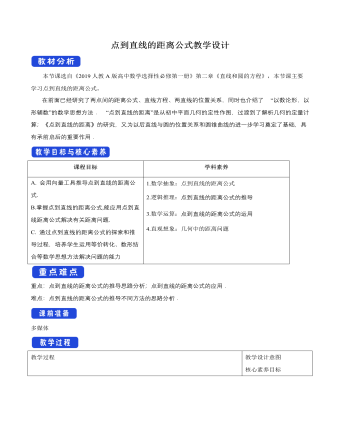
点到直线的距离公式教学设计人教A版高中数学选择性必修第一册
4.已知△ABC三个顶点坐标A(-1,3),B(-3,0),C(1,2),求△ABC的面积S.【解析】由直线方程的两点式得直线BC的方程为 = ,即x-2y+3=0,由两点间距离公式得|BC|= ,点A到BC的距离为d,即为BC边上的高,d= ,所以S= |BC|·d= ×2 × =4,即△ABC的面积为4.5.已知直线l经过点P(0,2),且A(1,1),B(-3,1)两点到直线l的距离相等,求直线l的方程.解:(方法一)∵点A(1,1)与B(-3,1)到y轴的距离不相等,∴直线l的斜率存在,设为k.又直线l在y轴上的截距为2,则直线l的方程为y=kx+2,即kx-y+2=0.由点A(1,1)与B(-3,1)到直线l的距离相等,∴直线l的方程是y=2或x-y+2=0.得("|" k"-" 1+2"|" )/√(k^2+1)=("|-" 3k"-" 1+2"|" )/√(k^2+1),解得k=0或k=1.(方法二)当直线l过线段AB的中点时,A,B两点到直线l的距离相等.∵AB的中点是(-1,1),又直线l过点P(0,2),∴直线l的方程是x-y+2=0.当直线l∥AB时,A,B两点到直线l的距离相等.∵直线AB的斜率为0,∴直线l的斜率为0,∴直线l的方程为y=2.综上所述,满足条件的直线l的方程是x-y+2=0或y=2.

两点间的距离公式教学设计人教A版高中数学选择性必修第一册
一、情境导学在一条笔直的公路同侧有两个大型小区,现在计划在公路上某处建一个公交站点C,以方便居住在两个小区住户的出行.如何选址能使站点到两个小区的距离之和最小?二、探究新知问题1.在数轴上已知两点A、B,如何求A、B两点间的距离?提示:|AB|=|xA-xB|.问题2:在平面直角坐标系中能否利用数轴上两点间的距离求出任意两点间距离?探究.当x1≠x2,y1≠y2时,|P1P2|=?请简单说明理由.提示:可以,构造直角三角形利用勾股定理求解.答案:如图,在Rt △P1QP2中,|P1P2|2=|P1Q|2+|QP2|2,所以|P1P2|=?x2-x1?2+?y2-y1?2.即两点P1(x1,y1),P2(x2,y2)间的距离|P1P2|=?x2-x1?2+?y2-y1?2.你还能用其它方法证明这个公式吗?2.两点间距离公式的理解(1)此公式与两点的先后顺序无关,也就是说公式也可写成|P1P2|=?x2-x1?2+?y2-y1?2.(2)当直线P1P2平行于x轴时,|P1P2|=|x2-x1|.当直线P1P2平行于y轴时,|P1P2|=|y2-y1|.
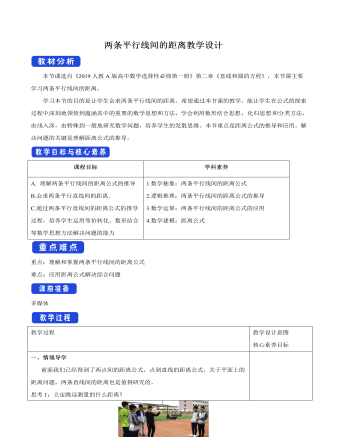
两条平行线间的距离教学设计人教A版高中数学选择性必修第一册
一、情境导学前面我们已经得到了两点间的距离公式,点到直线的距离公式,关于平面上的距离问题,两条直线间的距离也是值得研究的。思考1:立定跳远测量的什么距离?A.两平行线的距离 B.点到直线的距离 C. 点到点的距离二、探究新知思考2:已知两条平行直线l_1,l_2的方程,如何求l_1 〖与l〗_2间的距离?根据两条平行直线间距离的含义,在直线l_1上取任一点P(x_0,y_0 ),,点P(x_0,y_0 )到直线l_2的距离就是直线l_1与直线l_2间的距离,这样求两条平行线间的距离就转化为求点到直线的距离。两条平行直线间的距离1. 定义:夹在两平行线间的__________的长.公垂线段2. 图示: 3. 求法:转化为点到直线的距离.1.原点到直线x+2y-5=0的距离是( )A.2 B.3 C.2 D.5D [d=|-5|12+22=5.选D.]
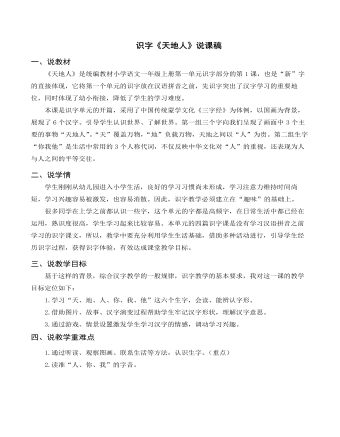
部编人教版一年级上册识字《天地人》说课稿
三、说教学目标基于这样的背景,综合汉字教学的一般规律,识字教学的基本要求,我对这一课的教学目标定位如下:1.学习“天、地、人、你、我、他”这六个生字,会读、能辨认字形。2.借助图片、故事、汉字演变过程帮助学生牢记汉字形状,理解汉字意思。3.通过游戏、情景设置激发学生学习汉字的情感,调动学习兴趣。四、说教学重难点1.通过听读、观察图画、联系生活等方法,认识生字。(重点)2.读准“人、你、我”的字音。五、说教法学法为了突出重点,化解难点,完成教学目标,选择行之有效的教学方法十分关键。根据新课标的具体要求,结合本节课的特点,我主要采用游戏激趣法、图文结合,利用多媒体课件调动学生学习的积极性。学生则通过游戏,联系生活实际,小组合作等方法学习6个生字。
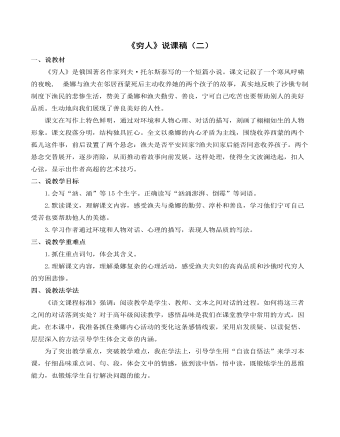
部编人教版六年级上册《穷人》说课稿(二)
三、说教学重难点1.抓住重点词句,体会其含义。2.理解课文内容,理解桑娜复杂的心理活动,感受渔夫夫妇的高尚品质和沙俄时代穷人的穷困悲惨。 四、说教法学法 《语文课程标准》强调:阅读教学是学生、教师、文本之间对话的过程。如何将这三者之间的对话落到实处?对于高年级阅读教学,感悟品味是我们在课堂教学中常用的方式。因此,在本课中,我准备抓住桑娜内心活动的变化这条感情线索,采用启发质疑、以读促悟、层层深入的方法引导学生体会文章的内涵。 为了突出教学重点,突破教学难点,我在学法上,引导学生用“自读自悟法”来学习本课,仔细品味重点词、句、段,体会文中的情感,做到读中悟,悟中读,既锻炼学生的思维能力,也锻炼学生自行解决问题的能力。
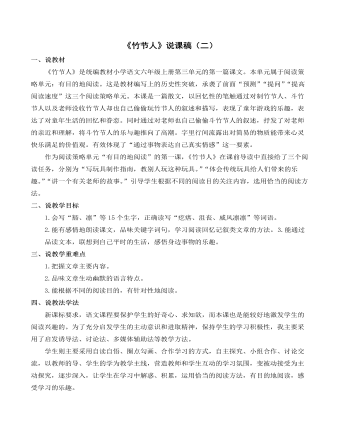
部编人教版六年级上册《竹节人》说课稿(二)
3.再读课文,划分段落结构。说说本文可以分为哪几个部分,简要概括各部分的主要内容。第一部分(1--2段):概述“我们”小时候喜欢玩自己做的竹节人。 第二部分(3--7段):写制作竹节人的过程。 第三部分(8--19段):主要写斗竹节人的过程与乐趣,表现了孩子们对竹节人游戏的喜爱。 第四部分(20--29段):主要写老师没收了竹节人,却也偷偷在玩竹节人的趣事。 尊重学生的初始阅读感受,引导学生有意识地根据课前导语部分的阅读任务进行有目的地阅读,在自主探究中发现阅读方法。接着小组交流:根据不同的阅读目的,是怎么阅读课文的。让学生交流、丰富自己的阅读方法,同时教师适时引导,让学生学会积累、运用恰当的阅读方法。在对阅读任务的把握上,感知课文内容,理清文章层次,这样学生对文章内容结构的划分就水到渠成了。
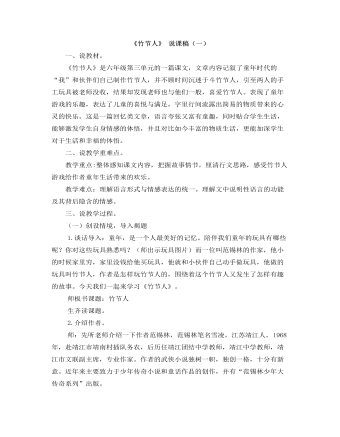
部编人教版六年级上册《竹节人》说课稿(一)
一、说教材。《竹节人》是六年级第三单元的一篇课文,文章内容记叙了童年时代的“我”和伙伴们自己制作竹节人,并不顾时间沉迷于斗竹节人,引至两人的手工玩具被老师没收,结果却发现老师也与他们一般,喜爱竹节人。表现了童年游戏的乐趣,表达了儿童的喜悦与满足,字里行间流露出简易的物质带来的心灵的快乐。这是一篇回忆类文章,语言夸张又富有童趣,同时贴合学生生活,能够激发学生自身情感的体悟,并且对比如今丰富的物质生活,更能加深学生对于生活和幸福的体悟。二、说教学重难点。教学重点:整体感知课文内容,把握故事情节,厘清行文思路,感受竹节人游戏给作者童年生活带来的欢乐。教学难点:理解语言形式与情感表达的统一。理解文中说明性语言的功能及其背后隐含的情感。
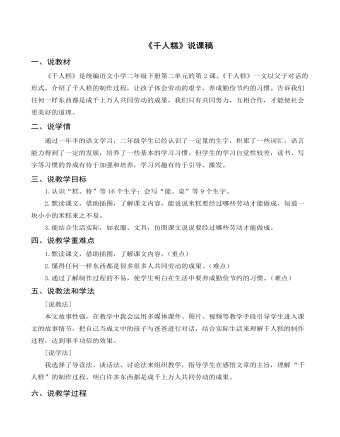
(说课稿)《千人糕》部编人教版二年级上册语文
四、说教学重难点1.默读课文,借助插图,了解课文内容。(重点)2.懂得任何一样东西都是很多很多人共同劳动的成果。(难点)3.通过了解制作过程的不易,使学生明白在生活中要养成勤俭节约的习惯。(难点)五、说教法和学法[说教法]本文故事性强,在教学中我会运用多媒体课件、图片、视频等教学手段引导学生进入课文的故事情节,把自己当成文中的孩子与爸爸进行对话,结合实际生活来理解千人糕的制作过程,达到事半功倍的效果。[说学法]我选择了导读法、谈话法、讨论法来组织教学,指导学生在感悟文章的主旨,理解“千人糕”的制作过程,明白许多东西都是成千上万人共同劳动的成果。
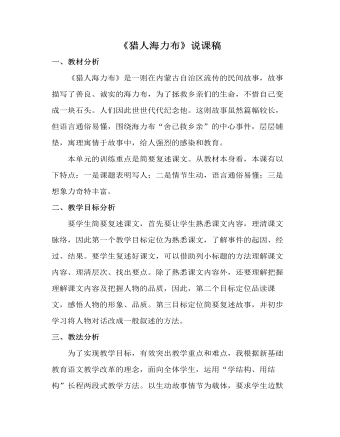
部编人教版五年级上册《猎人海力布》说课稿
一、教材分析《猎人海力布》是一则在内蒙古自治区流传的民间故事,故事描写了善良、诚实的海力布,为了拯救乡亲们的生命,不惜自己变成一块石头。人们因此世世代代纪念他。这则故事虽然篇幅较长,但语言通俗易懂,围绕海力布“舍己救乡亲”的中心事件,层层铺垫,寓理寓情于故事中,给人强烈的感染和教育。本单元的训练重点是简要复述课文。从教材本身看,本课有以下特点:一是课题表明写人;二是情节生动,语言通俗易懂;三是想象力奇特丰富。二、教学目标分析要学生简要复述课文,首先要让学生熟悉课文内容,理清课文脉络,因此第一个教学目标定位为熟悉课文,了解事件的起因、经过、结果。要学生复述好课文,可以借助列小标题的方法理解课文内容、理清层次、找出要点。除了熟悉课文内容外,还要理解把握理解课文内容及把握人物的品质,因此,第二个目标定位品读课文,感悟人物的形象、品质。第三目标定位简要复述故事,并初步学习将人物对话改成一般叙述的方法。
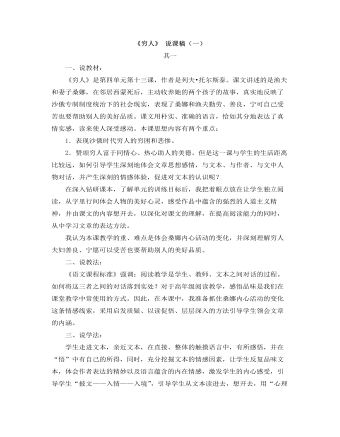
部编人教版六年级上册《穷人》说课稿(一)
四、说教学过程:我准备分两课时来完成本课的教学。现在着重说说第一课时,在这一课时里,主要引导学生初读课文,自学字词,了解课文的主要内容。通过学习,学生了解到文章讲的是渔夫和妻子桑娜(板书)在邻居西蒙死后,主动收养西蒙的两个孩子的事。抓住重点语句细读深思、用心感悟。在理解内容的基础上,把握文章的中心,体会穷人的美好心灵。体会他们的善良、乐于助人的美好品质。这样,学生就能由浅入深,由表及里地探究课文,使教路、学路、文路和谐统一,同步进行,从而培养学生多方面的语文能力,实现教师、学生、文本之间的对话。我设计了这样的结束语:“选择责任,选择实践良知,这是最重要的东西。选择爱,主动给别人爱,就会有意想不到的收获!”

人教版高中历史必修3辉煌灿烂的文学说课稿
教师:不同的时代造就了不同风格和不同精神内容的诗词,请同学们回顾必修一和必修二两宋中央集权的加强和经济的发展状况。学生:回忆回答。教师:请同学们结合时代背景和词的特点理解词为什么能够成为宋代文学的主流形式和标志?学生:两宋时经济重心转移到了南方,商业发展打破了时间和空间的限制,城市繁荣,市民数量不断增加。词的句子长短不齐,便于抒发感情,并且能够歌唱,更能适应市井生活的需要。于是,词成为宋代文学的主流形式和标志。教师:宋代文人地位提高,宋词就是一个个时代的画卷:大宋的悲欢离合都写在了里面。除了词之外,宋代民间还兴起了一种新的诗歌形式,即散曲。学生:回答散曲的发展阶段及特点、元曲的含义、特点。教师:在中国古代诗歌辉煌发展的同时,也产生了供人们闲来无事消遣的小说。
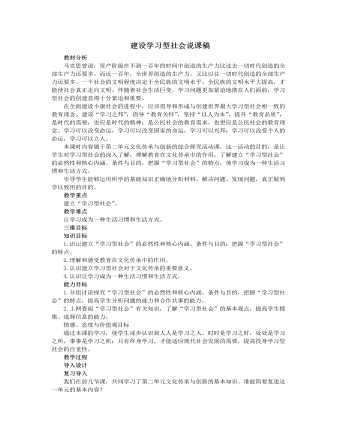
人教版高中政治必修3建设学习型社会说课稿
解析:材料是讲学习型社会所产生的影响,A项观点错误,在当前和今后相当长的时间里,学校教育仍然是人们获得知识的最重要的途径。B项观点错误,终身学习只是成就人生目的的手段、途径,而不是目的本身。D项说法错误,当前我国社会的中心工作是经济建设。二、问答题5.材料一:日本是公认的漫画大国,日本的动漫产业产值每年230万亿日元,成为日本的第二大支柱产业。在日本,漫画比电影、小说有时甚至比电视或音乐更受欢迎。日本漫画的热潮还席卷了世界:日本每年出口到美国的卡通片价值就达5 000亿日元,是日本对美国钢铁出口金额的4倍;漫画中的人物被迅速复制成电子游戏、卡通片及真人演出的节目。原来只是闲暇时候消遣的漫画,正飞速渗透到人们的生活中。值得警惕的是,除了催人奋进的精华之外,日本漫画中也存在暴力、色情、扭曲历史等诸多糟粕,对缺乏辨别能力的青少年产生了许多不良影响,更引发了一系列深刻的社会问题。

人教版高中政治必修4生活处处有哲学说课稿
(二)组织学生探究知识并形成新的知识。我从学生的生活体验入手,运用案例等形式创设情境呈现问题,使学生在自主探索、合作交流的过程中,发现问题、分析问题、解决问题,在问题的分析与解决中主动构建知识。主要通过几幅漫画让学生思考其中的哲学道理,开始接触哲学。漫画一:种瓜得瓜,种豆得豆,种鸡蛋得??漫画二:甲:下雨好极啦!乙:下雨糟透了!漫画三:——狂妄之徒,你竟然坏了祖上规矩!在引导学生思考、体验问题的过程中,可以使学生逐步学会分析、解决问题的方法。这样做既有利于发展学生的理解、分析、概括、想象等创新思维能力,又有利于学生表达、动手、协作等实践能力的提高,促进学生全面发展,力求实现教学过程与教学结果并重,知识与能力并重的目标。
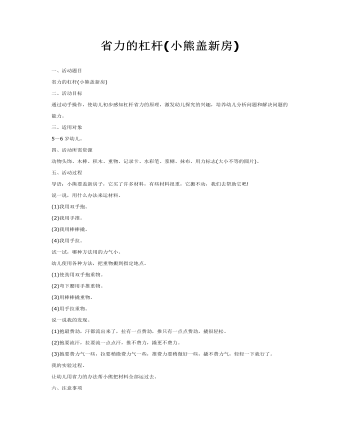
科学教案:小熊盖新房(省力的杠杆)
二、活动目标通过动手操作,使幼儿初步感知杠杆省力的原理,激发幼儿探究的兴趣,培养幼儿分析问题和解决问题的能力。三、适用对象5~6岁幼儿。四、活动所需资源动物头饰、木棒、积木、重物、记录卡、水彩笔、浆糊、抹布、用力标志(大小不等的圆片)。五、活动过程导语:小熊要盖新房子,它买了许多材料,有些材料很重,它搬不动,我们去帮助它吧!说一说,用什么办法来运材料。

